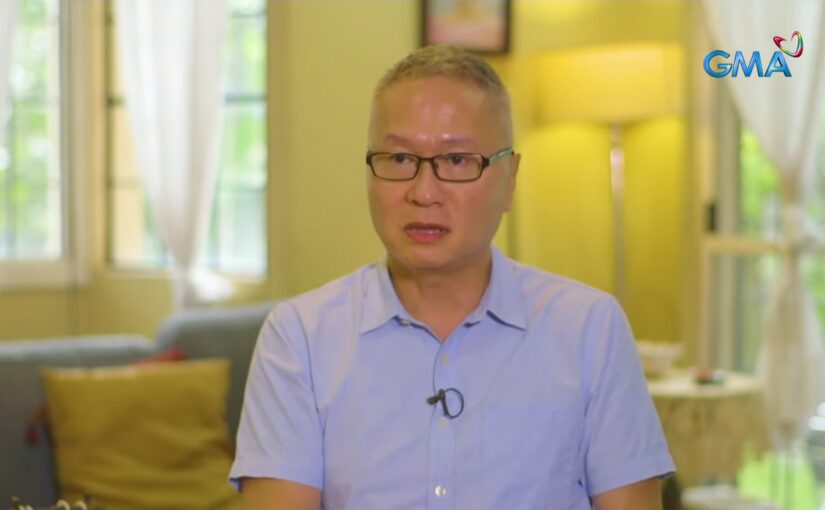Tag: Psychotherapist
Why we love heroes like Waymond and Forrest

by Nathan Chua
I am no expert movie analyst or critic, so pardon me if I dwell into an unfamiliar topic for me. I recently saw the movie that won several major awards at the Oscars this year which featured a character named Waymond. I could not help but smile when I heard Evelyn (the name of the character who is his wife in the film) express her disbelief that her husband had just turned into some kind of superhero by saying to Waymond, “You? With the fanny pack?” There are now two movie characters portrayed that I can count as my all-time favorites. The other one is Forrest Gump, a character played by Tom Hanks in a film released in the 1990s.
My guess is that I am not alone in this. Key Huy Kuan who played Waymond, won best supporting actor for his role, and Forrest Gump the movie as I remember, did really well at the tills as well as the Oscars of that time. From memory, I think Forrest Gump’s success at the box office was unexpected, since most movies that did well financially up to that point were sci-fi or superhero movies. I guess the stories and message of these characters don’t go unnoticed by the public and the experts. They resonate to us in an odd way. They have something that they don’t have. So to speak.
Although I am quite sure that there are many other movies that depict such unlikely heroes, these two are for me, the most inspiring. Having been in business, I couldn’t quite understand back in the 90s why a character like Forrest Gump would make me feel so much admiration towards someone who was supposed to be just existing to survive. Since learning more about the workings of the mind from an ACT (Acceptance and Commitment Therapy) perspective, I have discovered what it is that made me gravitate to Waymond and Forrest.
There is one thing they don’t have that I have that makes them such admirable characters. It’s an ego.
Let’s do a thought experiment here:
We love our dogs. Ever wondered why? Since I work with couples a lot, I’d like to use this metaphor. If you have seen a male dog get snarly when its mate has gone off with another male dog, that’s part of their mating instinct. When the mate comes back to it or if the male dog has successfully fended off the competing male, then the couple can just go on being with each other without much of a fuss. It’s as if nothing had happened. With human couples though, it takes more time to get back to the usual interactions. We humans have a real handicap when it comes to being present with our lot in life. Any couple going through recovery from a transgression can admit that their thoughts can make them do things that don’t match the situation. They can be fast asleep and start a major fracas in bed even though they know they have important matters to take care of when the sun rises.
Another example would be if you forgot to feed your dog at the usual time. Guess what your dog will do when you finally present it with dinner? Will it snarl to show anger and frustration that you took your pet for granted? On the contrary, your dog will be extremely happy and grateful to you just hearing the familiar noises that come with dinner. Try noticing what happens if you forgot to prepare dinner for your spouse or kids. You could get an earful and maybe a night full of grumblings.
End of thought experiment.
There are subtle ways we project our egos. We can start noticing what image we want to present to the people we meet. Here’s one that may sound familiar: While you come a bit late to a party, you tell the people who welcome you about how busy you were with so many business meetings. Get it?
Waymond and Forrest are lovable characters because they just lived according to what is closest to their hearts and available to their senses:
For Forrest, it was his love for Jenny and Bubba, as well as Lieutenant Dan. Remember the scene where he punched a guy who was harassing Jenny? Once he got Jenny with him, that was all that mattered. Once he started the shrimping business and Lt. Dan came back to be his friend again, they were all that mattered.
For Waymond, it was his wish to be kind and loving to all and to have as much fun doing laundry and taxes with his wife, daughter, and father-in-law.
Both were without egos, and both with much love and wisdom that we all have at times, tucked away inside of as humans. There is a part of us that wants what Waymond and Forrest don’t have. The good news is, we do have the capacity to also not have what they don’t have. We just have to be more mindful of what it is that’s in front of us.
How to create lasting change in your relationship: Video!
How language can affect your mental health
by Nathan Chua
Ah, the functions of language! Until recent years, I have never thought about how language played a role in our ability to sustain our mental health. As the theory behind this new approach that I am using is framed upon language and how we use it, I would like to introduce you to a few terms that we use in a way that can cause us to experience unnecessary depression, excess anxiety, and even attempts at suicide!
The first expression we use quite a lot in the field of counseling is the word, “healing.” I remember in the years I spent in graduate school, this word was used quite liberally. In fact, there was even a book that had, as part of its title, the words, “wounded healer.” Healing though connotes the idea that we are somehow broken and that we need to be put together like a puzzle or a broken vase in a clinical setting.
Reality though would tell us that this can be nothing more than a figure of speech that at the least, could be considered unhelpful. Because nothing inside of us is really broken. It is rather a form of learning to resort to certain strategies that provide instant relief from emotional pain that end up unproductive and futile; and thereby rendering us feeling more ineffectual and deserving of our sad fate. We are whole and complete. What we suffer when we are said to be having some psychological problems is that of being stuck in a pattern of behaviors that do not serve our best interests.
The next phrase or term I have learned to be used in unhelpful fashions is the idea that comes from stories of people who supposedly went from being dead to surviving a coma. It is often said that they see a great white light and felt immense peace! Attempts at suicide are basically logical responses to removing the difficult feelings brought on by our attempts at living what comes as meaningful to us. It is better to die, since one: it will remove the painful emotions we experience from our pursuits for meaning and purpose, and two: there will be unimaginable bliss thereafter. Unfortunately, allow me to paraphrase an expert in behavioral analysis who said in jest that there has so far been no one on record to have answered a survey from death that talks about how much better it is on that side.
The last term for this post is the word, confidence. We often combine this with the word, “feel.” This means that confidence is a feeling that we need to achieve in order to do something of significance. As Dr. Steven Hayes likes to use etymologies in his work, the word actually means having full trust or faith in Latin. We have somehow in our modern usage of the term used it to mean that it is something we feel rather than something we do. We can still put our full faith in ourselves even as we feel anxious about doing a certain task.
Remember that the best way to live is to focus on what we do rather than what we feel, because there is the possibility of redemption in the former. Our feelings are subject to change and outside of our control. If we hang our hats on them, we will find ourselves stuck in a cycle of frustration, and eventually see ourselves as broken vessels that need to be pieced together, or brought to a place where we choose to end it all permanently for temporary relief from the varied emotions we experience that come with truly living.
Do you need counseling?
Do you need counseling for depression, anxiety, trauma, relationship (marriage, family) problems, insomnia, anger management problems, infidelity, teen parenting issues, grief processing, addiction, procrastination, work performance, and even weight issues?
We are here to provide you with evidence-based approaches that are backed by reliable and valid scientific research!
We provide both in person and online video counseling for your convenience.
Please text (preferred) or call:
Mobile Number: +63 917 886 5433 (LIFE)
Available also on Viber and WhatsApp!
(The best option is to message this number through Viber or WhatsApp and we will gladly call you back or reply!)
You can also call our booking hotline!
Booking Hotline: +632 8396 6007
The booking hotline is available 24/7!
Email:
Connect with us through Facebook, follow us through Spotify and YouTube.
Our offices are located in Quezon City, Metro Manila, Philippines.
CMS Clinic
2nd Floor Back to the Bible Building
135 West Avenue, Quezon City, Metro Manila, Philippines
and
M Place South Triangle
8004 Mother Ignacia Avenue, Quezon City, Metro Manila, Philippines
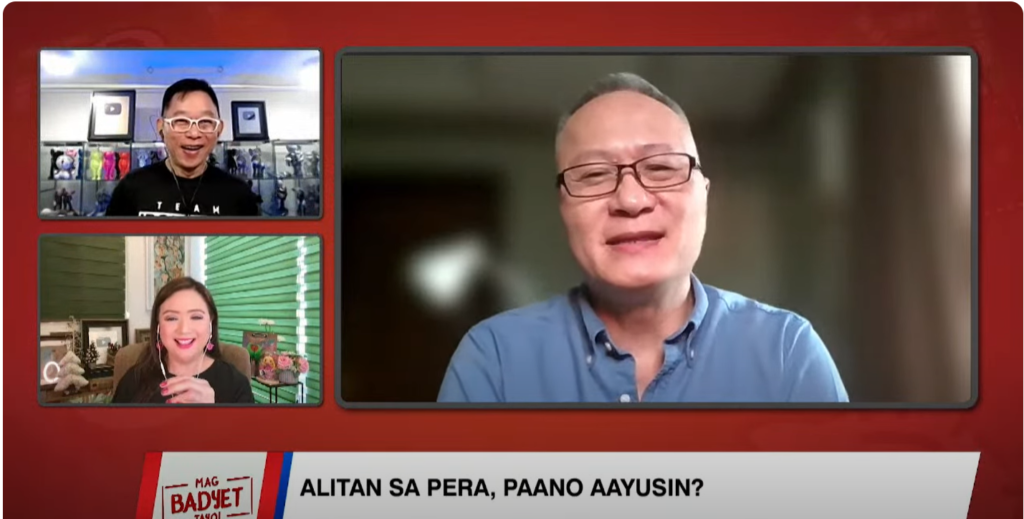
Nathaniel Chua is a member of an international organization called the Association for Contextual Behavioral Science (ACBS). He became chair of the Diversity, Equity, and Inclusion Special Interest Group (DEI-SIG) of ACBS; the first Non-North American to do so.

Nathaniel Chua has a Master’s Degree in Counseling and continues to learn more of the most cutting-edge approaches to working with the human condition.
Below is Nathaniel Chua’s first virtual talk held on November 17, 2023 in front of an international group of therapists from Low or Middle Income Countries (LMIC). He is the first from the Philippines to do this:
What is One Life Only Counseling about?
- You can be assured that your information with be kept completely confidential.
- You will be respected regardless of your religion, gender preference, ethnicity, economic status, and even your personal lifestyle and values. We are LGBTQIA+ friendly!
- Your counselor will not impose their values and beliefs on you.
- We use a scientific model of counseling that has precision, depth, and scope. Below are bullet points to let you understand better what we mean by this:
- By precision we mean that our approach to counseling tells you how these mechanisms of change work. It is not enough to say that a sense of self-awareness is what creates changes in people’s behavior. Our approach tells us how self-awareness works as one step within a set of processes that can lead to lasting change.
- Depth means the approach we use does not conflict with other theories and models of therapy. In fact, many other approaches can be used as forms of treatment towards greater psychological flexibility. Our approach for instance does not conflict with findings in the area of attachment theory, gestalt therapy, psychodynamic therapy to just raise a few examples. It cuts across other levels of analyses.
- Finally, by scope we mean that our approach comes from the discovery of the smallest set of processes that cuts across multiple mental health concerns from anxiety and depression to personality disorders to psychosis, etc. It is a transdiagnostic approach that seeks to understand what many of the symptoms or syndromes come down to, so these processes can be targeted to address many, if not all of the disorders listed in different diagnostic systems.
- We are also probably the only counseling service in the Philippines that follows a certain philosophy of science with certain a priori assumptions about human nature. With this in mind, we offer a holistic consistent approach to life’s challenges that is a-ontological, monistic, and pragmatic.
- Furthermore, ineffective behaviors are addressed by their classes and functions, therefore making our model of therapy parsimonious and much easier to apply to daily living. Most of our clients are empowered to use the skills they learn in therapy to apply to a multitude of challenging situations without having to rush to a therapist to address specific concerns. If you remember Einstein, everything can be explained by one simple equation, E = mc squared! In other words, we do our best to be ACT-Consistent or as some other experts would call it, we practice, ACT Fidelity!
The approach we use is also one that is endorsed by the World Health Organization as an effective psychological tool for coping with any kind of life crises! It can be described as a kind of psychological vaccine that has been found to be effective in improving and promoting mental resilience in the face of many, if not all kinds of life challenges.
Here’s a paraphrase from Dr. Steven C. Hayes in my interview with him on April 5th, 2022:
“Here’s what the World Health Organization, the best public health and scientific group in the world says about this protocol, this extensively tested protocol is helpful for anyone who is stressed, for any reason, in any circumstance.”
Since 2019, we have been very excited to offer this type of a radically different approach to therapy that is not just about relieving symptoms, but also about helping people towards creating lives imbued with meaning and purpose.
Here’s a video about what makes One Life Only Counseling Services different:
You can read the written version of this video through this link: https://www.onelifeonly.net/about/what-makes-one-life-only-counseling-services-different/
Here is a recent interview for an article on Philstar Life featuring Nathaniel Chua and a legal practitioner about marital sexual consent:
https://philstarlife.com/news-and-views/928796-consent-rape-marriage-explainer
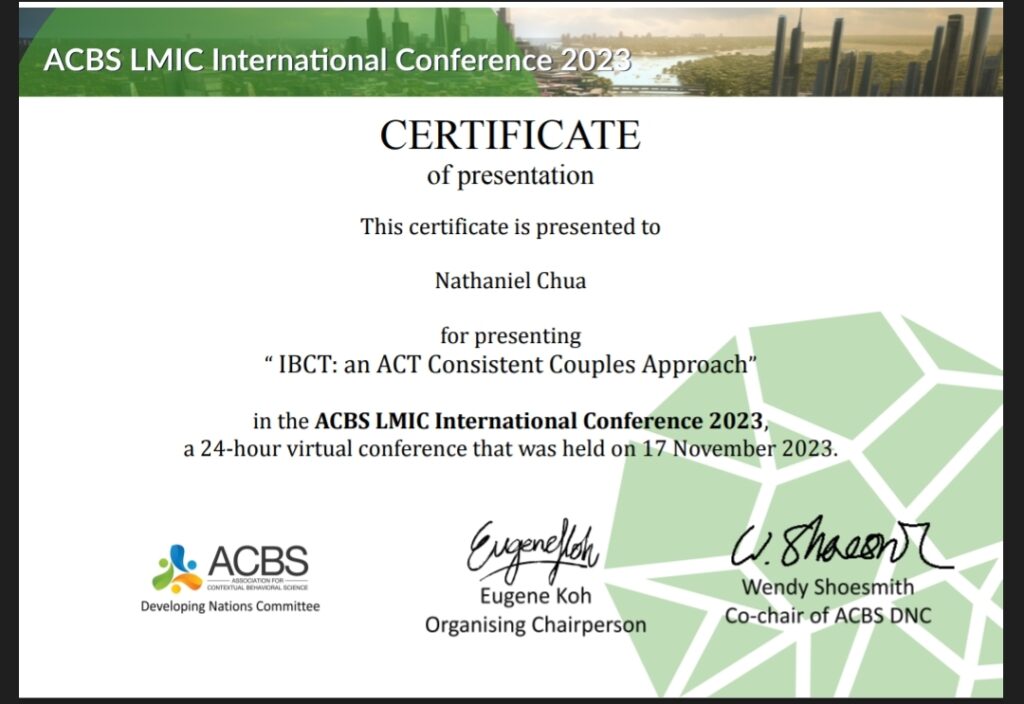

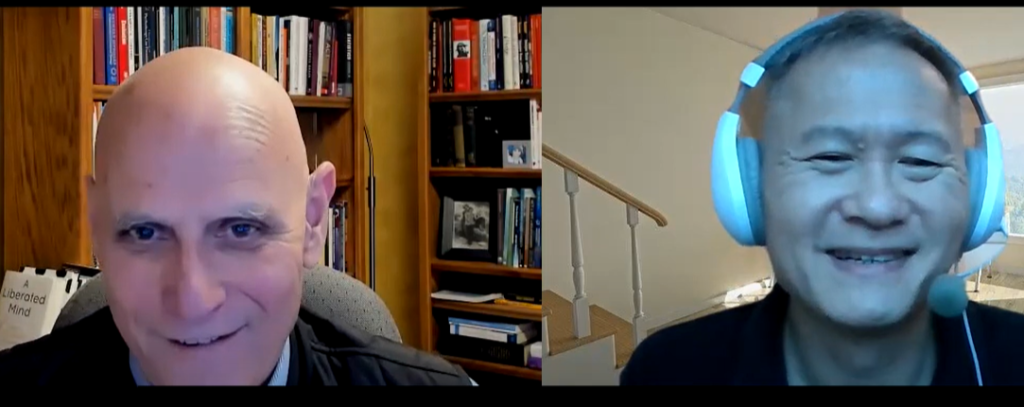
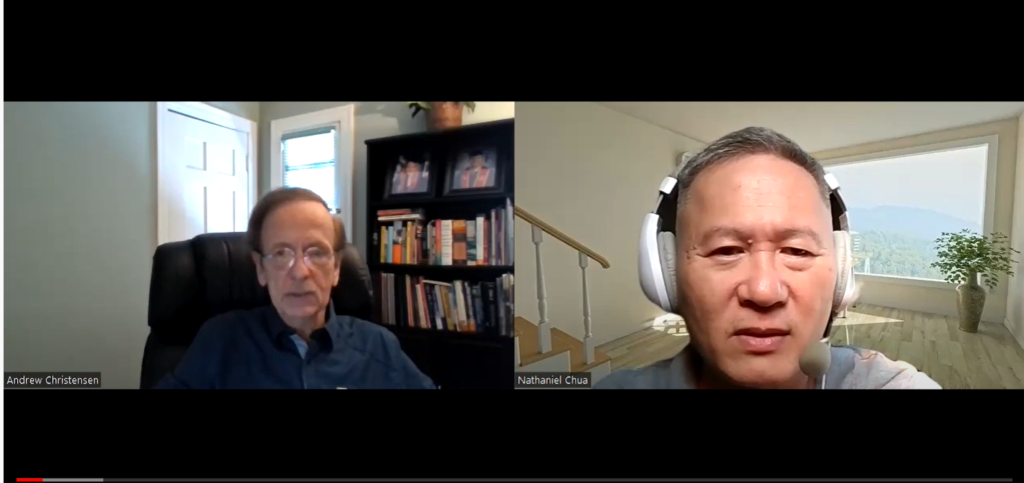
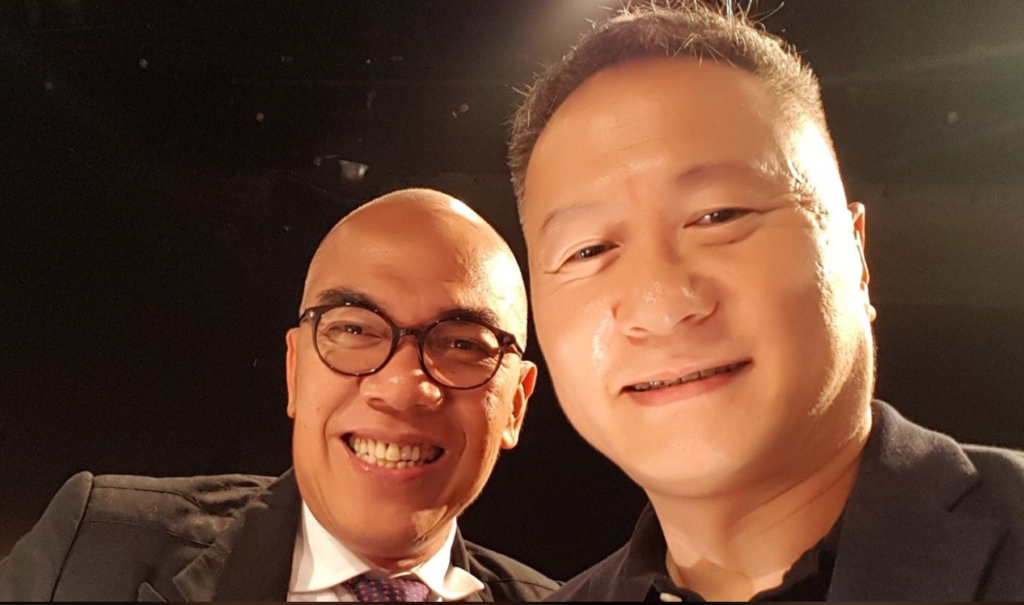

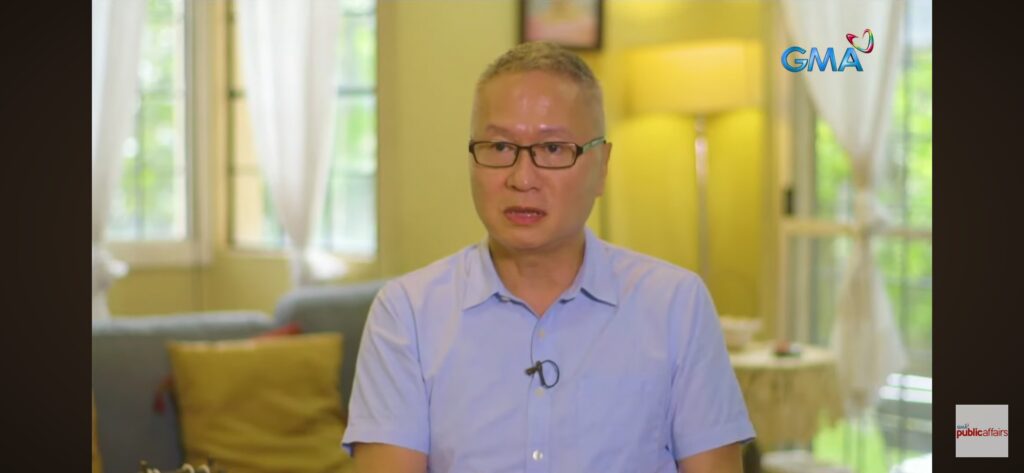
Here a video of Nathan Chua’s appearance on a “Dapat Alam Mo” Episode:
Here’s a solo interview of Nathan Chua with an ACT Matrix Expert and Counselor from the United States, Jacob Martinez:
Interviews with the experts:
Here are two interviews with the two experts that have had a huge impact on my work in recent years. They are with Dr. Steven Hayes and Dr. Andrew Christensen. Here are the videos:
Making Your New Year’s Resolution Work
by Nathan Chua
I think even without a new year to celebrate, many of us have often made certain commitments that we hope to accomplish beginning at a certain time. Well, looking back, how many of those commitments have we fulfilled? What is it that keeps us from getting from point A to point B?
One way we end up not doing what we resolve to do has to do with reasons. Our logical minds have evolved to find cause and effect relations. This is an important function because in order to solve problems in our environment, we need to know what causes something to happen. For instance, relevant to today’s issues, our minds needed to find out what causes the spread of the coronavirus in order for us to keep infections down and manage the extent of the pandemic. The scientists needed to know how the virus causes life-threatening pneumonia, for them to find ways to counteract the process of fatal illness developing in people.
The only drawback to this mental capacity is when the rule becomes inflexible. They are applied across other domains when they don’t really put us on a path to where we want to be. For example, we say, “I have to eat chocolate if I am sad.” The rule here is sadness should be removed by eating unhealthy snacks. However, we can reverse this statement and say, “I should not eat chocolate to stop me from feeling sad, because in the end, the lack of control of my behavior makes me even sadder and therefore the urge becomes stronger.”
Now if reasons really have so much power over us, wouldn’t we be all following the reasons why we should not be eating chocolate when we feel sad? The answer is no matter what the reasons our minds come up with, we still can opt to act one way or the other. This only means that no matter how much we try to give ourselves reasons to do stuff, we can always make a decision that complies or doesn’t comply with the behavior we want to either stop or begin doing more of.
This means reasons are just thoughts that our minds come up with for us to make logical decisions. Unfortunately, what may sound logical may not be what’s good for us. Now, you might be thinking, what then do I do about this? Well, one way to do it is to first notice your thoughts as thoughts. They are not you. Your mind is just a part of you and your bodily functions.
One way to practice this ability to keep your thoughts separate from you, is to give your mind a name. Thank him or her for the suggestion. You’re not bad for having those thoughts, it’s just part of your minds’ functioning. It is nothing more than a reason-manufacturing tool.
You can also add in one more step. You can notice what sticking to your diet is in the service of. Maybe you’d like to become more attractive so you can start having more opportunities to find a date. It could be that you’d love to see your kids grow old enough to see them go through different life stages. Whatever your motivations are, it is best to come up with ideas that give you intrinsic motivation, rather than those that make you think that you are a bad or lousy person if you don’t follow your resolutions. The latter only spirals into the negative feedback loop of emotions.
And finally, keep in mind that whatever life-enhancing habits we want to create, it takes time and patience. Your road will not be a straight line. Every time you fail at your commitments, you can always pick yourself up and keep going towards a direction you want. We are creatures who want to create habits that work for our lives. If we suffer an injury to our leg, we still want to stand up and walk again, don’t we? And yes, you and I will fall to the ground as we rehab, but we pick ourselves up and keep going, with pain and all. Because walking matters, just like living does too!
When Anger Strikes
by Nathan Chua
Anger was a familiar foe to me. As a child, I saw how anger in the family was able to get the giants at home what they wanted from myself and others. And so I learned that albeit unpleasant and unbecoming, anger can be a means to a good end. Anger for me was never an end in itself. People should understand the reason for my short temper, so I thought. Yet, there would probably be very few occasions when I would realize that my angry behavior served me in good stead as I pursued the good ends.
Much of what ails us with anger is not about the feeling itself, but rather the coping style that most of us use as we feel this difficult emotion. You see, my biggest problem with my anger was precisely what I had just indicated in the opening sentence of this blogpost. Anger had become a familiar foe, when all it was, was a part of my nervous system telling me that I just experienced frustration or disappointment or anxiety.
For as long as anger remained my enemy, then it would continue to stand in the way of me becoming the person I wanted to be. Back in my days as a businessman, anger got in the way of my acting in a manner that was most faithful to my deepest aspirations for my life. My inner yearnings to help the people around me made me passionate about keeping the business healthy and viable. Mistakes at work meant a step backwards and threatened to move the company away from this goal. My mind dutifully and persistently told me that the solution to avoiding mistakes, is to exert control over the people working for the business with my anger. Unfortunately, gaining full control over other people is like keeping ocean water from being salty.
The logical solution was to intimidate people into feeling motivated every day. What’s worse is that my mind has learned this dictum to try and try the same thing over and over again until I succeed. Put in another more familiar way, my mind told me to do the same thing over and over again and expect a different result.
Here are some tips for you my readers on what to do when anger pays you a visit:
- Welcome your old friend and breathe into the feelings and body sensations that arrive with your anger.
- Notice it and observe it in your body. Observe what it is egging you to do. Notice it with a beginner’s mind.
- Remind yourself that this is but part of a journey, a hero’s journey if you will, and you just encountered something that is getting in the way of the valued outcomes you want at this very moment.
- Give yourself some compassion as you suffer through these obstacles and difficult feelings.
- Remember what it is that you wish to stand for in your life.
- Notice the thoughts as thoughts and not as commands that will make you go in a different direction if you’re not aware. Remember the actions your mind will dictate can move you away from the valued outcomes you had imagined.
We all have seen the unfortunate results of harsh behaviors in our midst. We have also seen how it affects our sense of purpose and meaning as we go through the daily challenges of life and relationships. Anger is neither bad nor good. It’s just a feeling that we all can contain within us. It is a part of us. Not wanting it is akin to saying that you want your tongue to taste only food that is pleasant. Unfortunately, our tongues and other senses come in a package. We will feel both ends of the spectrum of emotions.
And if you are like me, your anger might have something to offer you. For many years, my anger had been telling me that I did care about the business, because its viability meant the well-being of the people involved. This realization has helped me see what was behind my frustrations and disappointments. I cared and I still do to this day. May we experience the benefits of accepting life for all the bitter-sweet experiences it presents. As an old ACT saying goes, “We care where we hurt and we hurt where we care.”
Pursuing the Happy Life
by Nathan Chua
When you raise your head to look ahead as you traverse the busiest streets of Manila, there will undoubtedly be dozens of billboards craning for your attention as you look into the distance and survey the sea of traffic ahead of you. It sort of is a means to break the monotony of tail lights shimmering about several kilometers ahead. Lots of cheery faces showing you how much more you can grab out of life if only you had that new car, home, outfit, hairstyle, and yes, even that new loan! Yeah, that is the good life, the feel good life!
Positivity has become the antidote to much of what we experience in life as trials and misfortunes. We can always just think about positive things and all will be alright as far as our internal mechanisms are concerned.
Just recently heard Dr. Steven Hayes in one of his podcast interviews talk about the futility of this approach to life’s realities. Once again he uses an interesting comparison of this “feel only the good” agenda to just wanting our fingers to feel things that we like. Unfortunately, that is only doable if we totally remove the sense of touch from our fingers. There is no way to teach our fingers to just feel the good ones and not the bad ones. If you feel the soft touch of your pillow at night, you will also feel the roughness of sandpaper as you work on some cleaning project at home. Removing what we dislike can only be done if we remove all the sensations our fingers can feel.
It’s a pretty apt metaphor for not wanting to feel unpleasant emotions. Our minds and our nervous systems come with the ability to experience both sides of the spectrum. If we constantly wish to run away from difficult thoughts and feelings, we will also end up unable to feel pleasant emotions. If we numb ourselves from feeling difficult emotions, we also by default have to remove ourselves from feeling the opposite.
Because of the constant barrage of information we get saying that, the meaningful life ought to make us feel good, we lose touch with what is truly important to us. Maybe that very thing that you have been looking for to find meaning in your life is really contained in some activity that you wish you could do, if only your mind would stop telling you that it’s too hard! Forget about it, you will end up just getting hurt.
Maybe it is in that project you wished you could start because it is where you lose consciousness of time when you engage in doing it. But you are afraid that you will end up being a laughing stock to your friends and family if you did. Maybe it’s in that dating life that you wish you can resume after a painful divorce. But your mind tells you, you better not, because it will hurt even more. Maybe it is taking that step to talk to your child about something you wish he or she can see from your perspective. But your mind tells you, you will just end up spoiling your kid and surrendering some of that power you have over him or her.
All of these yearnings point to what truly matters to us and the existential anxiety we have about how we spend our time as we remain alive and conscious. If it is important for you to have that career, then you will feel anxious pursuing it. If it is important for you to have a good relationship, then you will feel terrified by the idea of meeting new people for romantic reasons. If it is important for you to be loving to your child, then you will feel like you’re walking on eggshells raising one.
As an old ACT saying goes, we care where we hurt and we hurt where we care. Anything that is worth pursuing in life will hurt because we care about them. It won’t always be happy. There is no guarantee unfortunately. The only thing that is sure is that if you pursue a life that matters rather than a life that’s happy, you will then know what it means to live meaningfully. As one 19th century sage put it, “He who has a why to live for can bear almost any how.”
How couples go from, “aisle, altar, hymn” to “I’ll alter him (her)!”
by Nathan Chua
If you are like most people who are frustrated with their partners’ incorrigible ways, here’s an option you might want to consider. What if you and your partner can become more objective in the way you view each other’s peculiarities? What if these defects were just your differences? What if you view your differences more from your past perspective of why you two clicked in the first place?
Of course, this is always as we say, easier said than done. That person you thought had all the complementary qualities you wish you yourself had, has now turned into a nuisance. You fell in love with him because he was always cool, calm, and collected. He was never frazzled by any of the crises you had to deal with in your months or years of dating. Unfortunately, you realize that these same qualities when displayed in certain situations, are not the source of solace and comfort you wish they would be. They now come across as snooty or insensitive, dismissive of how you feel about your current problems at work or at home. You now complain and criticize, and your partner is flabbergasted. He thinks it’s unfair for you to come up with new standards of how he should be. Isn’t it that you loved me with all these qualities before? Why do you want to change me completely all of a sudden?
Now, I have gone through so many approaches to couples counseling in my years of working with distressed couples and have found this so far to be the most intriguing of all and probably can turn out to be the most effective. I call it the, Why Of Course You Do Therapy! Why? Because I realized that these are the very words I would be mentioning quite often in my work with couples! Given the circumstances and given your histories, you will react in certain ways that are quite predictable and understandable.
The problem starts when each of the parties in the relationship begin to demand, criticize, show annoyance, and reject attempts at connection or reconciliation. What were qualities that each of you accepted early in your relationship, are now irritants that turn you into adversaries. Your partner becomes a project to change. As mentioned earlier, your partner will feel rather betrayed if what he or she thought were things you were willing to accept, have now become unacceptable. The differences that you had once accepted have now turned into defects that can make or break the relationship.
The key is that through acceptance, your partner may in turn notice how much harder you are working to come to terms with what can be difficult to change. The irony in psychology is that unless we learn to accept things as they are, then change can happen. As the words of the great Carl Rogers remind us, “”The curious paradox is that when I accept myself just as I am, then I change.” This works well with couples too! The more your partner senses that he or she is accepted, then they feel more motivated to change. Why so? It’s the paradox of the human mind, the paradox of being human!
Sunset Mode of Mind
by Nathan Chua
Happiness, contentment, gratitude, a look on the bright side. These are just some of the terms that we throw around a lot like an old ad slogan, but find eternally elusive.
I remember a former philosophy professor write this on the board once, “Humans are insatiable beings.” I have pondered on this truth for so long but have long wondered what the reason for this is. I am now beginning to see the light at the end of the tunnel in my long search for an explanation. Maybe science has found the answer, the behavioral sciences that is.
As far as this area of study is concerned, the culprit is really our human minds. Don’t get me wrong. I am not here to say how stupid our minds can get. In reality, our minds are wonderful! Without them we would not be where we are now as a species. We’d be subject to what other species experience on a daily basis that we can only imagine in movies which depict our prehistoric existence.
Pardon my writing nowadays as I adjust to talking more like a scientist than before when humanistic language came very easily to me. So help me out here, I am struggling trying to get a more scientific message across. Nonetheless, it is my hope that my blog remains as inspiring to you as it is for me to write my thoughts and share them with you, my visitors and subscribers.
I digress!
So here’s what our minds are very good at doing. Our minds are judgmental machines. They can churn out all kinds of criticisms anytime, anywhere. You can try this at home. Pick any object in your room wherever you may be (you can even be at a friend’s house, but just do this quietly in your head for your sake and your friendship’s!). Now try to see everything that’s wrong with it. Go ahead, try it. When you’re done, do it twice more on two different objects you see in the room.
If you’re like most everyone else, you would probably notice that your mind can really do a great job of this. It gets better as you move from one object to another. Do you see now what I am driving at? That’s your friend Mind’s forte!
Ever noticed how some of the most successful, famous, and wildly attractive people in the world can’t seem to get to a point where they can say, “Hey, this is great! I am happy where I am at!” You would have probably noticed that in yourself too. Look back about five years ago and think of the things you have now that you wished you had then. Remember how unsatisfied you were with what you had and where you were at? If you have been losing some stuff you used to enjoy, then it becomes all the more easier to let your mind go and tell you how much more stuff you still need.
That in a nutshell is what our minds do. It’s natural and it also is the secret to why humans dominate the earth. So don’t worry or don’t fret if you feel like a selfish person for thinking that you don’t have enough. It is your mind, mind you, that’s doing it for you. It thinks it is doing you a service by keeping you thinking about what you could be missing or what could go wrong when you’re missing what you’re missing.
But what you can learn here that your mind cannot get, is that you are a human being that is capable of noticing what your mind is doing. All those judgmental critical thoughts of who you are and what you’ve accomplished are just part of the deal of being a human with a brain. The key here is to know when it’s happening and make a pivot or shift towards what life has to offer in the moment. For this moment is all we really have. Neither can we change the past nor control our future. It is this moment that we can change and we can control!
It is that mode of mind that tells you you are watching the sun go down, and you look with wonder and surprise at how wonderful it can be. You know, that sunset mode of mind, like the title of this blogpost? I betcha you can’t appreciate the sunset and do the exercise we just did in this post! I don’t think so! For who wants to see the sunset and figure out what’s wrong with it? Not me, and I guess neither do you.
And guess what, science has come full circle to an old eastern tradition of being mindful. The answer was found in the future, in the form of science that has gone to the past to find the answer!
Mindfulness gets us into that sunset mode of mind…everyday! Do it while you’re brushing your teeth or walking around your neighborhood…and see how great it is to be alive just by being more present, more conscious, and more aware!
Until the next (more scientific) blogpost. See ya!


